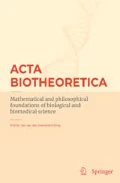Abstract
The origins of the ‘incommensurability problem’ and its central aspect, the ‘meaning variance thesis’ are traced to the successive collapse of several distinctions maintained by the standard empiricist account of meaning in scientific theories. The crucial distinction is that between a conceptual structure and a theory. The ‘thesis’ and the ‘problem’ follow from critiques of this distinction by Duhem, Quine and Feyerabend. It is maintained that, rather than revealing the ‘problem’, the arguments leading to it simply show the inadequacy of the reductionist theory of meaning. The genuine remaining problem is that of the development of a new theory of meaning in science.
Similar content being viewed by others
References
Achinstein, P. (1973). On meaning dependence. In: R. Grandy, ed., Theories and Observation in Science.-New Jersey, Prentice Hall.
Carnap, R. (1956a). Empiricism, semantics and ontology. In: Meaning and Necessity. -Chicago, University of Chicago Press.
Carnap, R. (1956b). The methodological character of theoretical concepts. In: H. Feigl and M. Scriven, eds., Minnesota Studies in the Philosophy of Science, Vol.1. - Minnesota, University of Minnesota Press.
Duhem, P. (1962). The aim and structure of physical theory. - New York, Atheneum.
Feyerabend, P. (1955). Carnaps Theorie der Interpretation theoretischer Systeme. - Theoria21, p. 55–62.
Feyerabend, P. (1958). An attempt at a realistic interpretation of experience. - Proc. Aristotelian Soc., New Series,LVIII, p. 142–170.
Feyerabend, P. (1962). Explanation, reduction and empiricism. In: H. Feigl and G. Maxwell, eds., Minnesota Studies in Philosophy of Science, Vol.III. - Minnesota, University of Minnesota Press.
Feyerabend, P. (1965a). Problems of empiricism. In: R. Colodny, ed., Beyond the Edge of Certainty.-Pittsburgh, University of Pittsburgh Press.
Feyerabend, P. (1965b). Reply to criticism. In: B. Cohen and M. Wartofsky, eds., Boston Studies in the Philosophy of Science, Vol.II.-New York, Humanities Press.
Feyerabend, P. (1970). Against method: An outline of an anarchistic theory of knowledge. In: H. Feigl and G. Maxwell, eds., Minnesota Studies in the Philosophy of Science, Vol.IV. - Minnesota, University of Minnesota Press.
Hesse, M. (1972). Duhem, Quine and a new empiricism. In: H. Morick, ed., Challenges to Empiricism. -Belmont, CA, Wadsworth Publishing Co.
Hesse, M. (1974). The structure of scientific inference. -Berkeley, University of California Press.
Kuhn, T. (1962). The structure of scientific revolutions: International encyclopedia of unified science, Vol.2 (2).-Chicago, University of Chicago Press.
Kuhn, T. (1972). Incommensurability and paradigms. In: H. Morick, ed., Challenges to Empiricism.-Belmont, CA, Wadsworth Publishing Co.
Lewis, C.I. (1952). The given element in empirical knowledge. - Philos. Rev. 61, p. 168–175.
Lewis, C. I. (1956). Mind and the world order. - New York, Dover Publications.
Nersessian, N.J. (b). Aether/Or: The creation of scientific concepts (submitted for publication).
Nersessian, N.J. (1979). The roots of epistemological ‘anarchy’.-Inquiry 22(4), p. 423–440.
Nersessian, N.J. (a). Scientific evolutions: Changing conceptual structures in science.-The Hague, Martinus Nijhoff Publishers (forthcoming).
Quine, W.V.O. (1960). Word and object.-Cambridge, M.I.T. Press.
Quine, W.V.O. (1963). Two dogmas of empiricism. In: From a Logical Point of View. - New York, Harper and Row.
Quine, W.V.O. (1966). On Carnap's views on ontology. In: The Ways of Paradox.-New York, Random House.
Quine, W.V.O. (1969). Ontological relativity and other essays. - New York, Columbia University Press.
Quine, W.V.O. (1970). Grades of theoreticity. In: L. Foster and T.W. Swanson, eds., Experience and Theory. -Amherst, University of Massachusetts Press.
Quine, W.V.O. (1973). The roots of reference: The Paul Carus lectures. - LaSalle, IL, Open Court.
Author information
Authors and Affiliations
Additional information
This paper was written while I was Visiting Fulbright Research Scholar at the University of Leiden and the Museum Boerhaave, Leiden.
Rights and permissions
About this article
Cite this article
Nersessian, N.J. Why is ‘incommensurability’ a problem?. Acta Biotheor 31, 205–218 (1982). https://doi.org/10.1007/BF02627650
Received:
Issue Date:
DOI: https://doi.org/10.1007/BF02627650


